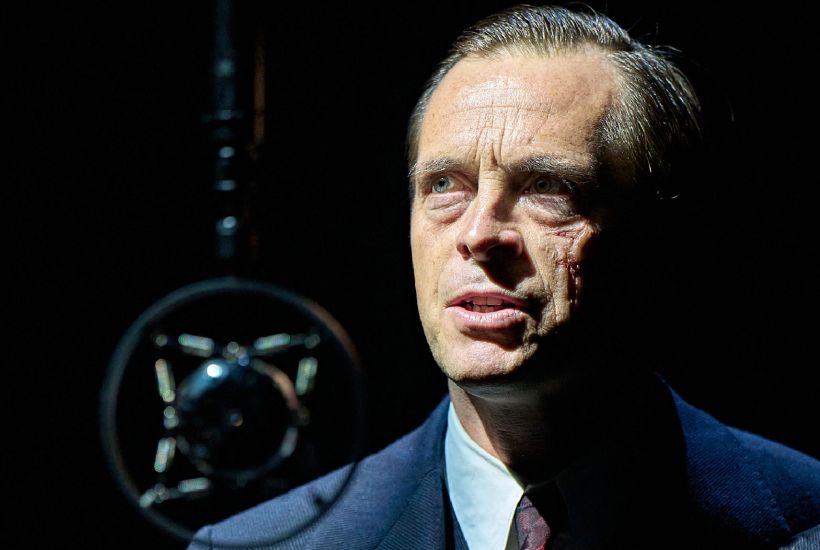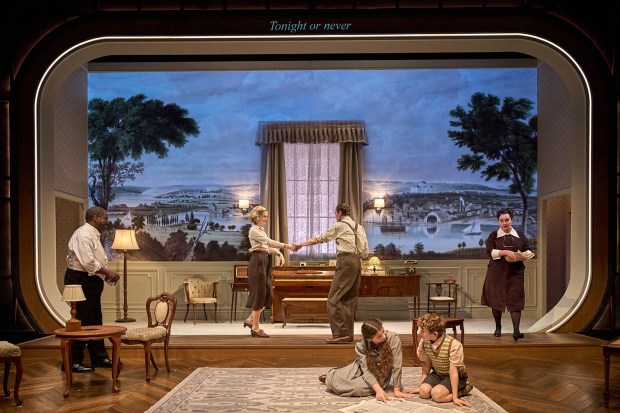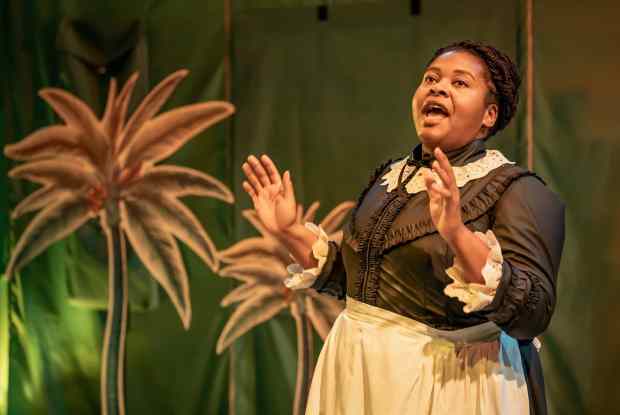When Winston Went to War with the Wireless is the clumsy and misleading title of a new play about John Reith’s stewardship of the BBC during the 1926 general strike. Churchill, chancellor at the time, has a minor role as an irascible plodder who makes jokes without a punchline. His role is intended to foreshadow Boris’s career and the characters keep mentioning the gold standard and its damaging effects on Britain’s economy. Gold standard is code for Brexit, of course.
The real subject, John Reith, is played by Stephen Campbell Moore who runs the BBC like a YouTube channel. It’s a solo effort, apparently. Reith writes and presents the news programmes and invites musicians and comic collaborators to play the odd gig. Most of his days are spent fighting off bothersome government wonks who try to censor his output. To add to his woes, he’s haunted by the ghost of a male partner whom he betrayed in a complicated love triangle. But there’s no dramatic connection between Reith’s hassles at the Beeb and his tortured emotional life. What happened to Reith’s gay friend? Did he die in the war? Was he caught out and jailed? We’re not told. Was Reith even bisexual? No idea. You’ll have to research that afterwards because this is a history play that asks questions and never answers them.
Confusions mount up. Reith was 6ft 6in and the script refers frequently to his great height but Campbell Moore is about the size of Tom Cruise. Why not hire a tall actor or drop the reminders that Reith was a giant? It’s unclear why an Asian actor, Ravin J. Ganatra, is playing the Archbishop of Canterbury or what purpose is served by casting Haydn Gwynne as Stanley Baldwin. The costume designer has overlooked Baldwin’s lack of hair and plonked a dark bouffant wig on Gwynne’s head. Result: she looks like Christopher Walken in a gangster flick. An unkind remark but Gwynne chose to accept a role that could only end in absurdity.
Director Katy Rudd can’t decide what the show is about. Themes collide. Genres fail to gel. Snatches of unreliable history morph into anguished speeches about Christianity. We get a lecture on special effects during the early days of radio, and we’re treated to lots of street riots created by thesps screeching their lungs out and banging props together while strobe lights flicker. The sets look nice and the acting is fine but the muddled script feels like a TV drama that needs editing. How did it wind up on stage?
Jack Thorne is a fashionable and therefore overworked playwright who can probably bang out a drama like this in a month or two. It then gets passed to a crew of slapdash producers who lack the brains to ask whether terms like ‘problematic’, ‘earworm’ or ‘bandwidth’ were in use a century ago. The essence of drama lies in the skilful deployment of language and in the infinite possibilities of the spoken word. One day, perhaps, that information will reach the Donmar.
Frank and Percy follows the unlikely friendship that develops between two charming curmudgeons whose dogs play together on a London heath. Frank is a retired history teacher who recently buried his wife and wants to explore his sexuality. Percy, a decade older, is a sociology professor who harbours doubts about the Green cult and its armies of ‘morons gluing themselves to roads’. His latest book takes him on tour to American cities like Denver which he loathes: ‘I’ve never seen so many people openly enjoying sports.’
The two men share a caustic and quizzical outlook on life. ‘Karaoke?’ laments Frank. ‘I’d rather staple my face to a moving train.’ They discuss Roy Chubby Brown (‘an imbecile’), the etiquette of masturbation and the advisability of poaching monkfish in milk. Percy says that without independent thought, a university ‘is just an overpriced library’, and fears that the Green creed will put the entire world under house arrest: ‘Lock yourself up to save the planet.’ He invites Frank home for a ham-and-egg salad and the meal develops into a romantic tryst. Afterwards the exhausted lovers nuzzle in bed and discuss their lunch: ‘If I’d known that was going to be such an aphrodisiac, I’d have made the effort to trim my toenails.’
The idiom is Alan Bennett but the script bristles with provocative political sentiments. Roger Allam (Frank) and Ian McKellen (Percy) riff their way through the show like a couple of seasoned bluesmen playing a night of classics at their favourite club. You’d be forgiven for assuming that the dramatist, Ben Weatherill, is their contemporary. He’s barely 30. One to watch.
Got something to add? Join the discussion and comment below.
Get 10 issues for just $10
Subscribe to The Spectator Australia today for the next 10 magazine issues, plus full online access, for just $10.
You might disagree with half of it, but you’ll enjoy reading all of it. Try your first month for free, then just $2 a week for the remainder of your first year.














Comments
Don't miss out
Join the conversation with other Spectator Australia readers. Subscribe to leave a comment.
SUBSCRIBEAlready a subscriber? Log in